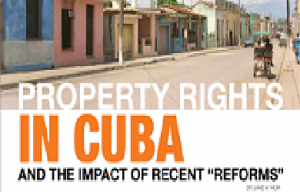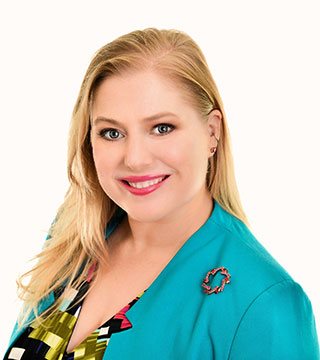 Shortly after the Cuban revolution brought Fidel Castro to power in 1959, the new regime abolished nearly all private property rights, resulting in a property system virtually unrecognizable to many Americans. Car sales were severely limited, and most homes effectively became the property of the state. With home ownership forbidden, home sales were likewise impermissible. Instead, the government would assign similarly unsalable residency rights to the homes. What was allowed was a trade, a permutar, of homes of “equal” value, with approval of the regulatory authority. This system created a strange economy of its own. The system for appraising homes was flexible, taking into account many factors, including bribes to officials. A new profession developed: the corredor was the closest thing Cuba has to a real estate agent. Corredores kept lists and contact information on people looking to swap houses, charging a small fee for each lead. Similarly, the sale of automobiles had also been restricted, with the exception of used cars built before the 1959 revolution, which have been widely traded in a booming black market for years. Because they could be legally traded among Cubans, old cars fetched prices many times what their value would be off the island. Often times, these cars would sell for thousands more than modern cars. Buyers would hand over large amounts of cash under what amounted to handshake agreements – titles never changed hands. As a result, Cuba’s streets are still occupied by 1950’s American classics like Chevrolet Bel Aires and Chrysler Imperials. Until 1990, state workers were allowed to purchase new Eastern Bloc-made cars. Since 1990, only state institutions had been buyers of new automobiles. Yet Cuba is trying to modernize and reform some of its property laws. In 2011, it passed laws that expanded business opportunities, and legalized the sale of cars and homes. Still, individuals are limited to one permanent residence and one vacation home, all real estate transaction must be completed through Cuban bank accounts with Cuban-approved funds, and the state retains the right to nullify any sale. One big issue with the new laws is that there are no property registries, no proof of current ownership, no chain of title. And many are wary of a government that has shown little hesitation in confiscating property in the past. It may be that what appears to be a loosening of restrictive property laws is instead a change that permits closer inspections of income, registration with the state, and retaliatory rescission of sales and confiscation of homes.
Shortly after the Cuban revolution brought Fidel Castro to power in 1959, the new regime abolished nearly all private property rights, resulting in a property system virtually unrecognizable to many Americans. Car sales were severely limited, and most homes effectively became the property of the state. With home ownership forbidden, home sales were likewise impermissible. Instead, the government would assign similarly unsalable residency rights to the homes. What was allowed was a trade, a permutar, of homes of “equal” value, with approval of the regulatory authority. This system created a strange economy of its own. The system for appraising homes was flexible, taking into account many factors, including bribes to officials. A new profession developed: the corredor was the closest thing Cuba has to a real estate agent. Corredores kept lists and contact information on people looking to swap houses, charging a small fee for each lead. Similarly, the sale of automobiles had also been restricted, with the exception of used cars built before the 1959 revolution, which have been widely traded in a booming black market for years. Because they could be legally traded among Cubans, old cars fetched prices many times what their value would be off the island. Often times, these cars would sell for thousands more than modern cars. Buyers would hand over large amounts of cash under what amounted to handshake agreements – titles never changed hands. As a result, Cuba’s streets are still occupied by 1950’s American classics like Chevrolet Bel Aires and Chrysler Imperials. Until 1990, state workers were allowed to purchase new Eastern Bloc-made cars. Since 1990, only state institutions had been buyers of new automobiles. Yet Cuba is trying to modernize and reform some of its property laws. In 2011, it passed laws that expanded business opportunities, and legalized the sale of cars and homes. Still, individuals are limited to one permanent residence and one vacation home, all real estate transaction must be completed through Cuban bank accounts with Cuban-approved funds, and the state retains the right to nullify any sale. One big issue with the new laws is that there are no property registries, no proof of current ownership, no chain of title. And many are wary of a government that has shown little hesitation in confiscating property in the past. It may be that what appears to be a loosening of restrictive property laws is instead a change that permits closer inspections of income, registration with the state, and retaliatory rescission of sales and confiscation of homes.
Read about “Vamos a Cuba” and “Cuba Changes Exit Visa Policy“ here.
Learn more about Jane Muir and Associates here:
- Jane Muir Co-Hosts Over the Rainbow Event
- Award Presented to Jane Muir
- Jane Muir wins Florida Bar Most Productive Young Lawyer Award
- Jane Muir named Finalist for 46th Golden Coconut Awards
- Muir Named 2016 Super Lawyers Rising Star
- Synergy Startup Accelerator Selects Jane Muir for Panel Counsel
- Business.com cites Jane Muir on “How to Turn Your Struggling Startup Around”
- Buzzfeed Cites Jane Muir

